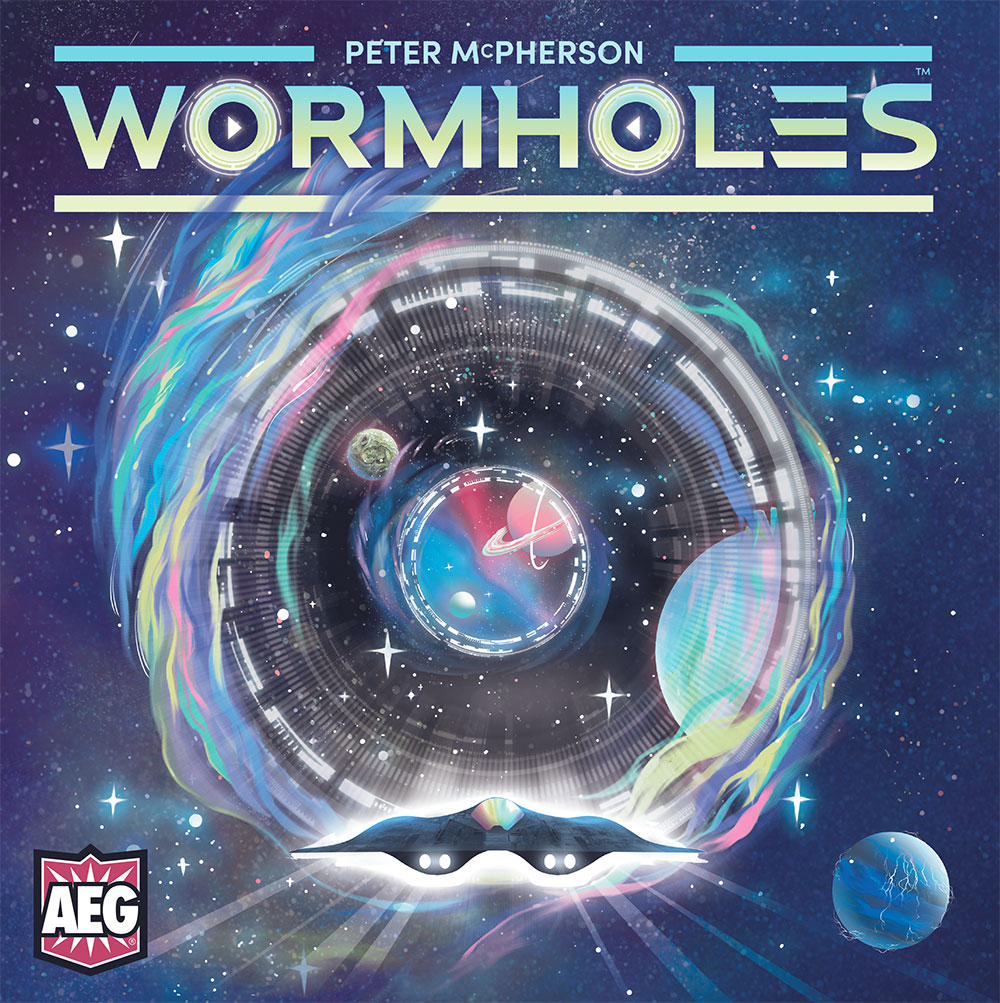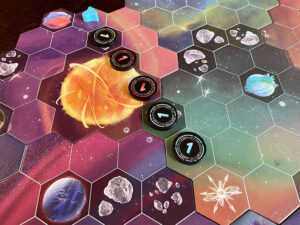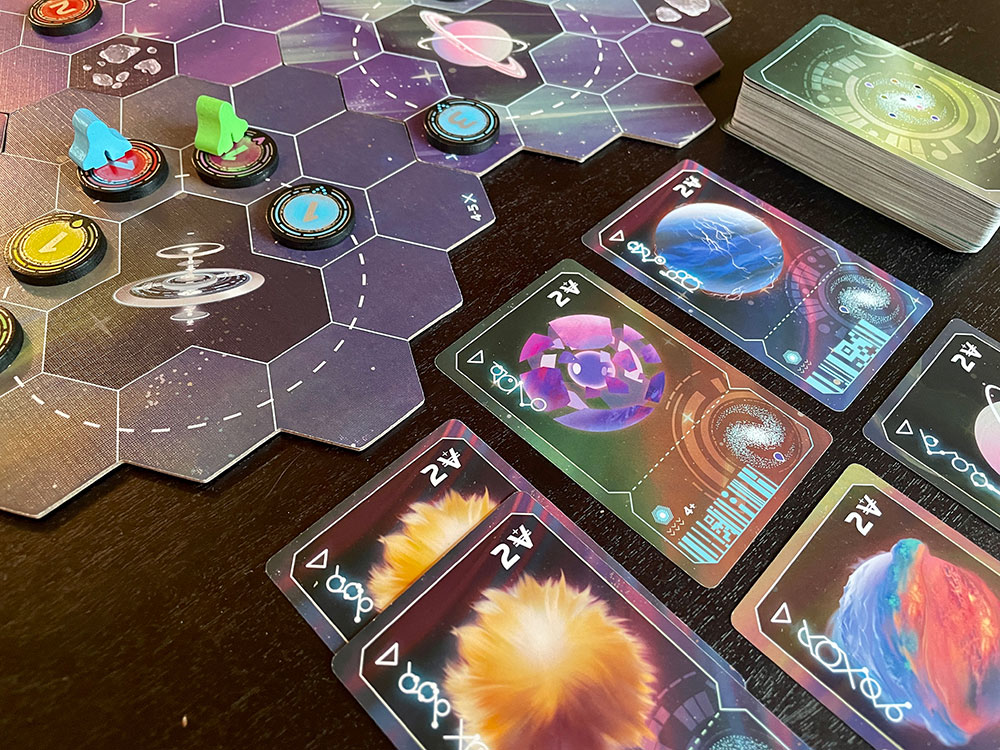
The vast void of space. Light years of nothing before you discover a patch of asteroids, a lonely planet, maybe even a forming star or black hole. Oh, to see the sights, to visit the far away and the unimaginable. If only there was a way to traverse the emptiness in a simple fashion. A way to connect two points in spacetime and zip through the created tunnel like stepping through a doorway. Imagine what we could do with this capability. The possibilities are endless.
Enter Wormholes. A new game for one to five players from publisher AEG and designer Peter McPherson of Tiny Towns fame. Players find themselves taking on the role of a passenger ship captain piloting through space by creating wormholes. We have the technology now, so what better way to use it than by shuttling the curious all over the galaxy? I can’t imagine anything more useful. Or more lucrative. Hop in my space Uber and let’s get you to your destination.
Gameplay Overview:
The ultimate objective in Wormholes is to deliver passengers to the planets they’d like to visit in as efficient a way as possible. To do this, players create wormholes in their wake, thus developing a network of instantaneous travel points that sees a vast board of interconnected space tiles slowly become a sea of ping-ponging spacecraft.

All players have three energy tokens that allow for up to three movement actions. Since the game board features ten tiles with up to nineteen spaces each, travel seems like it will be hard. But as you move around the board, you’ll be able to place wormhole tokens near you. When you place two tokens with the same number, they activate and allow free movement between them. Not just for you, but for anyone that wishes to utilize it. Wormhole placement is important. You create efficient shortcuts and receive residual victory points as other players use your wormholes—one point every time someone passes through, including another point for a return trip.
All this movement is in service of the passengers in your ship, which are represented by cards that feature the destination planet. Each card delivered is worth two points and players can drop off as many passengers to a single planet as they have in their hand. Player hand size is limited to four and can be replenished by using a free draw action (once per turn) at a planet. If the same planet where you’re located is drawn it goes to the space station market.

The space station is the starting point for the entire venture. Players jump out into space from this location, leaving behind a single wormhole to return eventually. When players are adjacent to the station, instead of drawing from the main deck, they can choose cards from the face up space station market that have been discarded over time. Sometimes returning to the station can provide exactly the passengers you need for your next drop off.
The other area where points accumulate is via discovery. The first player to place a wormhole next to a planet discovers it and receives a token. There are ten of these available and they dictate the game length. Once all planets are discovered, players have three more rounds before game end. Players also earn points by delivering to a diverse array of planets (three points per planet beyond five).
The space tiles feature destination planets, impassable asteroids, a sun or two, as well as some additional features. On the basic side of the space board, a photon cannon allows players to launch themselves in a straight line to a new location. On the advanced side, players can find wild wormholes, a planet with an orbit, as well as a black hole that makes travel a bit of a gamble. There are specific setup instructions in the rulebook, as well as variant options for variety.

Game Experience:
Wormholes is easy to teach and fast to play. With the correct placement of the photon cannon on the basic side of the board, games can move quickly as players race to be the first to discover distant planets and place wormholes that are convenient for others to use. Game length is a bit longer on the advanced side due to this feature not existing. The design decision to allow three more full turns after the final planet is discovered also takes away the pressure of the race to each planet, allowing players to play either tactically or strategically based on the flow of the game.

The pickup-and-deliver mechanism with the wormholes is unique as it allows players to effectively cheat movement rules. As such, the strategy of where to place these to not only allow travel far and wide but also entice others to utilize them is a fun puzzle. It doesn’t get too crunchy though, as the decision space is limited by the three movement actions you’re given each round. That said, once the game is nearing the halfway point, there should be enough wormholes in place at higher player counts to see ships jumping all over the galaxy dropping off passengers to multiple planets.
It’s super satisfying to use a wormhole you placed many turns ago to return to a planet you were first to reach and deliver three passengers in one fell swoop. Unfortunately, Wormholes is plagued by the luck of the draw, and this can affect the outcome of games when one player draws the perfect hand on their final turn. It keeps the game loose and a bit wild at times, so know this going in, especially if you’re a strategy player. There could’ve been more done to negate luck of the draw, but it seems that decisions were made to keep this game as low-overhead as possible, which is commendable in its own way.

If anything, it’s the space station market that attempts to negate some of the card drawbacks. By creating a market of cards that are free to add to your hand, there’s reason to keep a pathway back to the station in mind. Yet, it can still feel a little punishing heading back to the station when all the cards in your hand want you to go deeper into space, so it works on occasion, but isn’t consistent enough to be a true mitigation.
The exploration timer is a nice feature that truly limits sessions from getting out of hand. There could be a group meta where players do not want to discover a final planet and want to keep delivering to others, but scoring increases when exploring the final planets and this is enough incentive to seek them out.
The map features, such as the photon cannon or the black hole, are nice additions and provide variety to exploration. They are much more fun than the asteroid spaces that are inaccessible and typically easy to traverse by utilizing a wormhole. These features provide a little flavor to a game that is truly flying by the wormhole gimmick. For example, the passenger cards feature the destination planet, but not the passenger. There’s also no real reasoning behind player actions beyond the usage of the wormholes.

That said, I think Wormholes is ripe for expansion. If balanced properly, I could see the addition of player powers, ship upgrades, event decks, thematic deliveries, and much more. I’m sure the designer is aware of this and is awaiting to see if we enjoy the game enough to put the effort and energy into more Wormholes. I for one have had enough fun zooming through the galaxy to hold onto this copy and see what may be showing up through the next wormhole.
Final Thoughts:
A tight package that will provide plenty of excitement for those looking for a quick jaunt through space and time. I’ve played several games with family and friends, and we’ve had fun adding our own life to the galaxy we’re exploring, complete with planet names and passenger demands. It would be nice to see more flavor added though, so I’m keeping my eyes peeled for additions that either tone down luck or shift in the opposite direction to make Wormholes the wild west of space games. The pickup-and-deliver create-your-own-paths idea on display here is unique though. Recommended for anyone who finds the perfect card draw to be the highlight of their session. Not recommended for those who table flip when another player lucks into the perfect card for their next destination.
Final Score: 3.5 stars – Wormholes is light and fun, but it may be an expansion or two away from truly delivering an unforgettable experience.
 Hits:
Hits:
• Fast playtime
• Wormhole delivery combos
• Exploration token timer
• Space station market
Misses:
• No luck mitigation
• Design too scaled back
• Thematically nebulous
• Needs more options
CreditSource link







